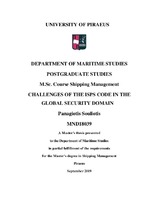| dc.description.abstractEN | The sea is a vast space that has always been exposed to a wide range of threats. Even more so nowadays, with many terrorist, piratical and cyber-attacks taking place in the oceans, open seas and port facilities, which cannot adequately be prevented or addressed by conventional military/security forces or other means. Thus, mariners today are exposed to risks when operating at ports or on-board vessels. Against this background and with a view to enhancing security, the International Maritime Organization (IMO) has developed a comprehensive set of requirements and guidelines, the International Ship and Port Facility Code – ISPS Code.
The ISPS Code requires that flag states, ships and all organizations engaged in the maritime industry, tighten their security gates. While this certainly has positive effects, including higher security levels, efficiency, effectiveness and competitiveness, it also includes costs in terms of increased operational expenses, administrative work and staffing demands.
The primary objective of this paper is to demonstrate how the ISPS Code is dealing with the aforementioned threats, what sort of challenges the maritime security faces and how the physical and cyber security are affected. Moreover, focusing on cyber security in particular, the paper will attempt to identify any existing gaps and recommend necessary corrective and streamlining steps to address them.
From the discussion, it becomes evident that the ISPS Code has achieved more in the field of traditional threats, resulting in a significant decrease of piratical incidents in the so-called Horn of Africa. In this respect, the ISPS by its nature has proved to be an effective protective shield against any illegal actions related to security matters. On the other hand, the cyber security field seems to have emerged as a brand-new field in security assessment, planning and policy making, as numerous and diverse cyber threats render the maritime industry more vulnerable. In this regard, the ISPS Code, and not only, still seems to be in a premature (experimental) stage, with no solid and tangible results yet. | el |


